| Srl | Item |
| 1 |
ID:
113216
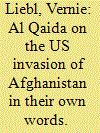

|
|
|
|
|
| Publication |
2012.
|
| Summary/Abstract |
This article consists of selected translations from captured interviews and dairies of Al Qaida members. The time period covered is from mid-2001 to early 2002 and concerns their operations in Afghanistan. The material clearly conveys a range of emotion, from confident to despondent, as well as efforts to contest the US actions. The first several pages give the reader context and some possible "lessons learned," but the story(ies) are best told by the Al Qaida members themselves. All names are pseudonyms.
|
|
|
|
|
|
|
|
|
|
|
|
|
|
|
|
| 2 |
ID:
097156
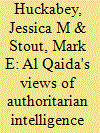

|
|
|
|
|
| Publication |
2010.
|
| Summary/Abstract |
Al Qaida and its jihadist allies shape their plans and operations substantially in response to threats they face from authoritarian intelligence services of the Middle East. While most jihadists initially believed that victory over their 'near enemies'- so-called 'apostate' regimes - should be their top priority, the ruthlessly effective security apparatuses of their home countries were significant factors in the transition to 'global jihadism', which emphasized the fight against the 'far enemy': the United States. This article presents al Qaida's views of the region's domestic intelligence services by examining captured documents and open source materials.
|
|
|
|
|
|
|
|
|
|
|
|
|
|
|
|
| 3 |
ID:
078943
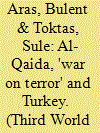

|
|
|
|
|
| Publication |
2007.
|
| Summary/Abstract |
The new wave of international terrorism gained strength in the aftermath of the 9/11 attacks, threatening not only the USA and its allies but also, as seen in the latest incidents, a significant part of the world. Continuing al-Qaida attacks signify the vulnerability and weakness of defence, security and intelligence systems in the face of the new international terror. The terror network has created an image of a postmodern virtual state. We argue that it has been shaped by a common ideology rather than in physical terms. Thus it is necessary to develop novel approaches. In this article we discuss Turkey's struggle against the new terror, underlining the fact that it is a Muslim majority state and has lively and dynamic Islamic traditions and different shades of Islamic belief. This situation makes the discussion more interesting, focusing on the position, perception, difficulties and struggle of a Muslim state with a democratic and secular mode of government vis-à-vis an allegedly Islam-inspired international terror network. There is an urgent need to develop an international terror strategy to counter terror attacks against Turkey, Britain, Egypt and others. We underscore the vital requirement of reconciling the macro-schemes and priorities of the global 'war on terror' with the national conditions and needs of the other countries involved in the struggle against the terror network.
|
|
|
|
|
|
|
|
|
|
|
|
|
|
|
|
| 4 |
ID:
118805
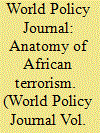

|
|
|
| 5 |
ID:
120051
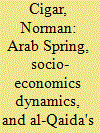

|
|
|
| 6 |
ID:
111040
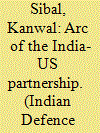

|
|
|
| 7 |
ID:
131111
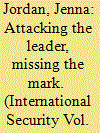

|
|
|
|
|
| Publication |
2014.
|
| Summary/Abstract |
Leadership targeting has become a key feature of counterterrorism policy. Both academics and policymakers have argued that the removal of leaders is an effective strategy in combating terrorism. Leadership decapitation is not always successful, however, and existing empirical work does not account for this variability. A theory of organizational resilience explains why decapitation results in the decline of some terrorist organizations and the survival of others. Organizational resilience is dependent on two variables: bureaucratization and communal support. Older and larger organizations tend to develop bureaucratic features, facilitating a clear succession process and increasing their stability and ability to withstand attacks on their leadership. Communal support plays an important role in providing the resources necessary for terrorist groups to function and survive. Religious and separatist groups typically enjoy a high degree of support from the communities in which they operate, and thus access to critical resources. Application of this theoretical model to the case of al-Qaida reveals that Osama bin Laden's death and the subsequent targeting of other high-level al-Qaida operatives are unlikely to produce significant organizational decline.
|
|
|
|
|
|
|
|
|
|
|
|
|
|
|
|
| 8 |
ID:
107457
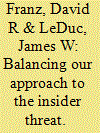

|
|
|
| 9 |
ID:
119724
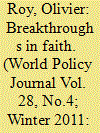

|
|
|
|
|
| Publication |
2011.
|
| Summary/Abstract |
Florence-Faith made a sudden breakthrough into contemporary global politics with the 1979 Islamic Revolution in Iran. From the Taliban to al-Qaida, the following three decades have been full of international tensions where faith was a leading factor, but this unease has by no means been restricted to the Muslim world. The Catholic Church found a new visibility under the leadership of John Paul II, shaking the communist grasp on Eastern Europe. Millions of converts from Catholicism to Protestantism are reshaping domestic politics in Brazil and other Latin America countries. Conversions from Islam to Christianity have created diplomatic hurdles in Malaysia and Afghanistan, while foreign missionary activities came under state scrutiny in India, Russia, and France. The Falun Gong sect waged an international campaign to pressure the Chinese government to remove a ban on the group. The affairs of Salman Rushdie and the Danish cartoons seemed to pit the Muslim world against the West, while the rise of Islam in Europe has raised anxieties in the United States and Israel, with the spectre of a looming Eurabia haunting urban neighborhoods and diplomatic corridors alike.
|
|
|
|
|
|
|
|
|
|
|
|
|
|
|
|
| 10 |
ID:
121902
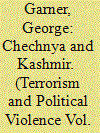

|
|
|
|
|
| Publication |
2013.
|
| Summary/Abstract |
This article examines the transformation of the Chechen conflict from a predominately nationalist to jihadist struggle, and compares the similar changes that took place in the Kashmiri insurgency. Using global jihadist strategy and ideology, and the accompanying influence of Al Qaida, both conflicts are shown to have taken on a new ideology and to have expanded beyond previous areas of operation. In both instances, the political leadership wrapped themselves in the mantle of political Islam (Islamism) as ensuing violence led to rapid socioeconomic transformation and social breakdown, thus allowing foreign jihadists to exert power and take up/divert the cause. In the past few years, two main groups originating in Chechnya and Kashmir have taken on Western targets and become more indoctrinated in Al Qaida's global jihadist ideology: the Caucasus Emirate (CE) and Lashkar-e-Taiba (LeT). The opportunist franchising strategy of Al Qaida could come to play a role in the future of both groups, especially if the CE is able to coalesce into a more unified front. More importantly, the global jihadist attributes of the CE must begin to garner the same attention in the Western world as that of LeT.
|
|
|
|
|
|
|
|
|
|
|
|
|
|
|
|
| 11 |
ID:
106002
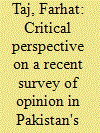

|
|
|
|
|
| Publication |
2011.
|
| Summary/Abstract |
This paper is a critically analysis of a public opinion survey recently conducted by the New America Foundation (NAF) and Terror Free Tomorrow (TFT) in the Federally Administered Tribal Area, FATA, of Pakistan on various issues pertaining to the war on terror. I argue that the survey misinforms about the tribal public opinion. To substantiate the argument I demonstrate that the survey is marred by ethical and methodological shortcomings.
|
|
|
|
|
|
|
|
|
|
|
|
|
|
|
|
| 12 |
ID:
089250
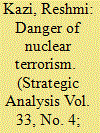

|
|
|
|
|
| Publication |
2009.
|
| Summary/Abstract |
The concept of nuclear terrorism is possibly the least understood of all dangers emanating from nuclear weapons. However, certain drivers like the nuclear black market (the AQ Khan Network), proliferation of nuclear technology, and the increasing demand for nuclear energy can make it easier for terrorist organizations like Al Qaida to acquire fissile material. The threat of nuclear terrorism cannot be ignored any longer. Nuclear terrorism is a plausible phenomenon that deserves adequate consideration, substantial countermeasures, expertise, and competence to combat it.
|
|
|
|
|
|
|
|
|
|
|
|
|
|
|
|
| 13 |
ID:
066067
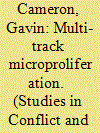

|
|
|
| 14 |
ID:
109200
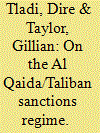

|
|
|
|
|
| Publication |
2011.
|
| Summary/Abstract |
The Al Qaida/Taliban sanctions regime established under Resolution 1267 of the UN Security Council has been under severe strain due to lack of adherence to due process standards. Over the years, the Security Council has incrementally adopted measures to try to alleviate some of the concerns, including through the creation of an ombudsperson to receive petitions from listed individuals requesting to be de-listed. In June 2011, the Security Council adopted two resolutions further strengthening the due process standards. This paper considers whether the new measures adopted are sufficient to respond to some of the concerns raised. While the new initiatives are a significant improvement, as a matter of law, the due process objections remain.
|
|
|
|
|
|
|
|
|
|
|
|
|
|
|
|
| 15 |
ID:
097615
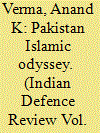

|
|
|
| 16 |
ID:
154236
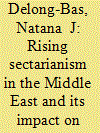

|
|
|
| 17 |
ID:
128236
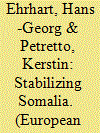

|
|
|
|
|
| Publication |
2014.
|
| Summary/Abstract |
States with limited statehood such as Somalia can cause transnational security challenges. The emergence of an insurgent group with links to Al Qaida and piracy emanating from its coast are cases in point. In this article, we tackle the question of whether the EU's comprehensive approach toward Somalia is working. To do this, we analyze its effectiveness, its legitimacy, and the influence of power by appraising three characteristics of the security governance concept in a critical manner. We conclude that the result is mixed. Even if the EU's comprehensive approach were perfect in a technical sense, it would still face restraints, because any solution has to come from Somali themselves. Not only should they be an integral part of it, they should become the real owners of the state-building process in the first place.
|
|
|
|
|
|
|
|
|
|
|
|
|
|
|
|
| 18 |
ID:
179833
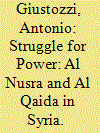

|
|
|
|
|
| Summary/Abstract |
Relying on interviews with members of the organization, the article argues (contrary to the prevailing view) that Al Nusra never split from Al Qaida and even more so from the global jihadist movement. Instead the leadership of Al Nusra was locked in a power struggle with Al Qaida over the control of jihad in Syria and possibly even over the future of Al Qaida itself. Efforts to unify the Syrian opposition, even those limited to jihadist groups, failed also because of the leadership of Al Nusra kept trying to co-opt other opposition groups, rather than forming alliances with them.
|
|
|
|
|
|
|
|
|
|
|
|
|
|
|
|
| 19 |
ID:
127511
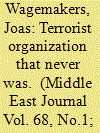

|
|
|
|
|
| Publication |
2014.
|
| Summary/Abstract |
This article deals with a radical Jordanian Islamist group wrongly called "Bay'at al-Imam," which existed from 1992-99 and included later al-Qa'ida fighter Abu Mus'ab al-Zarqawi. It attempts to shed light on this group, which has received little Western scholarly or media attention, by correcting earlier notions about its supposedly terrorist character and goals. Moreover, this article seeks to increase our understanding of ongoing debates between Jordanian radicals by focusing on their origins in this period in the 1990s.
|
|
|
|
|
|
|
|
|
|
|
|
|
|
|
|